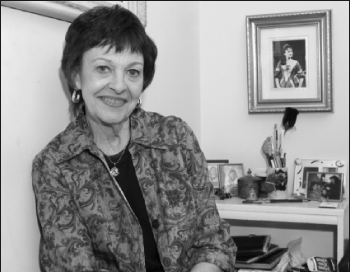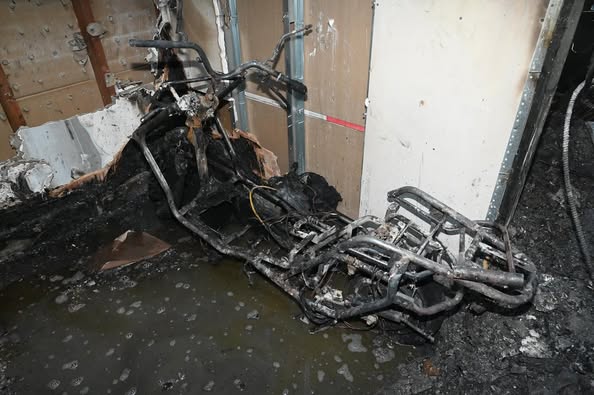Chelsea-based Maier envisions long life of cheering & chiding
By Trav S.D.
On a recent Sunday afternoon, at an hour of the day when most nightclubs are shuttered and silent, Joe’s Pub was the setting for an amazing alternative cabaret show. The sun was blazing outside; but inside, it may as well have been one o’clock in the morning.
Called “Idol Idle Idyll Worship – Sacred and Profane,” the show was hosted by trash-mouthed “Christian” country singer Tammy Faye Starlight. Guests included Justin Bond (a.k.a. Kiki of Kiki and Herb) singing glam versions of torch songs; fellow drag artist Our Lady J (a remarkable songwriter and Jerry Lee Lewis style boogie-woogie piano player); and Lisa Faith Phillips, whose performance piece concerned her career as a topless dancer and phone sex worker. Aside from the general level of outrageousness, these performers all share something in common: their voice teacher.
In a city (and an industry) of gimmicks and angles, Chelsea resident Barbara Maier has carved out a niche for herself as the vocal coach to New York’s more outré chanteuses. Her client roster includes not only those ladies named above but also Debbie Harry, Penny Arcade, Murray Hill, Diamanda Galas, Amber Martin, Roseanna Vitro, Meow Meow, Lady Rizzo, Lava Sperry and Sanda Weigl.
“I love teaching a variety of different kinds of performers,” says Maier, “The challenge of working with such individuals is that I don’t dictate what it will sound like. I work within the parameters of what they want. I’m just there to help them do what they do without hurting their voices. The challenge is in finding words to communicate to them across so many different styles. Teaching is like performing in that respect. It’s trying to get your message across.”
Perhaps not surprisingly, Maier says she never expected her path to lead her here. Born and raised in small-town Booneville, Indiana during the Great Depression, she comes from a family that wasn’t even particularly musical. “My aunts may even have been tone deaf,” she laughs. Still, she took voice and piano lessons from a young age, and remembers fondly a certain aunt who “was like Auntie Mame. She used to bring me on trips to Chicago to see all the big shows that toured there from Broadway.”
Her family encouraged her love for music and theatre — up to a point. “They definitely didn’t want me to pursue it professionally,” she says, “That — and the fact that I really hated music theory — was why I majored in psychology.” Maier seems to have learned a trick or two from her chosen major, however. She enrolled at Columbia to get her Masters in psychology, which very conveniently required her to move to New York (where she took private singing and acting lessons on the side). By the time she was working toward her psychology Ph.D., she started getting singing work in opera and musical theatre.
From the late 1950s through the 1970s, she traveled the globe (including such far flung ports of call as Cairo and Hong Kong) — performing everywhere from the New York City Opera to summer stock. “Because I’m only four foot eleven [in height], I was a natural ingénue,” Maier says. “But when I got to be in my 40s those parts sort of dried up, so I fell into teaching. I never expected to.”
She began teaching voice at the American Musical and Dramatic Academy at the Ansonia Hotel in 1976. According to Maier, her psychology training came in handy at her new calling. “At times, it’s like being a therapist,” she says. For a while, her eclectic slate of pupils included cantorial students; but in the 1980s, avant-garde superstar Diamanda Galas became one of her pupils. Galas referred her to Debbie Harry and soon word of mouth had innumerable performers from the downtown scene reaching out to her.
By 1974, downtown had become her natural habitat anyway. “My husband and I had been living at 72nd and Broadway until our daughter came along,” says Maier, “We needed a bigger place, and that’s why we moved to Chelsea. I’ve lived here ever since. It’s changed enormously in that time. I love all the art galleries and restaurants. None of that was here when we first moved to the neighborhood.”
Her affinity for what she calls “artsiness” stands her in good stead among her current clientele. Recently, her work has taken her out of the classroom and into the theatre. She coached the cast of the Broadway show “Passing Strange” last year, completed “Are You Going to Arabay” at Dixon Place and staged a benefit show for the Living Theatre at Joe’s Pub. Her most recent project has been a proposed series of “Depression Brunches” at the latter venue: early shows at which audience members are encouraged to bring their own food in order to keep the cost of the night club outing down. Hence the twelve noon start time of “Idol Idle Idyll Worship.”
The range of talent she works with was fully represented in the show. Tammy Faye Starlight’s act is mix of country and faux gospel, meant as a simultaneous tribute to and parody of the sounds of Nashville. Justin Bond’s repertoire is typically all over the map. The current occasion is no exception, as he uses the show’s depression theme as an occasion to try the Yip Harburg standard “Brother, Can You Spare a Dime?” — before switching to a selection from “Marat/Sade.” Our Lady J performs her own songs which are more in a modern pop, post-rock and roll vein. Lisa Faith Phillips is not a singer at all; her voice training supports the lengthy monologues she delivers. The sheer variety of this group alone is enough to keep anyone interested.
“I love my students so much,” says Maier, “I can’t think of doing anything else. Sometimes I think I want to die at my piano saying ‘No, no, no! You’re doing that all wrong!’”
But she hastens to add, “That may be a couple of decades from now. People in my family tend to live into their nineties.” Which is good news for students — and New York audiences.




































